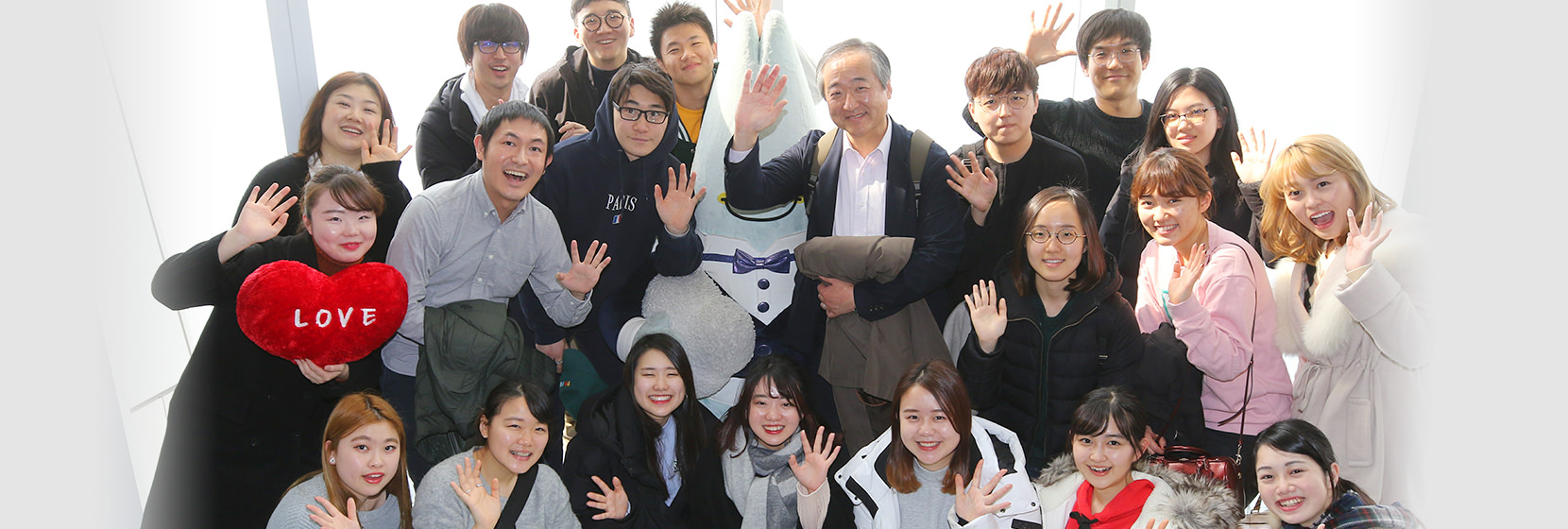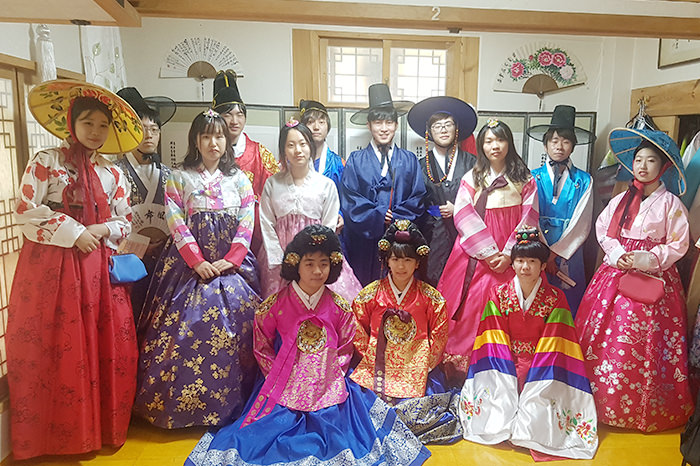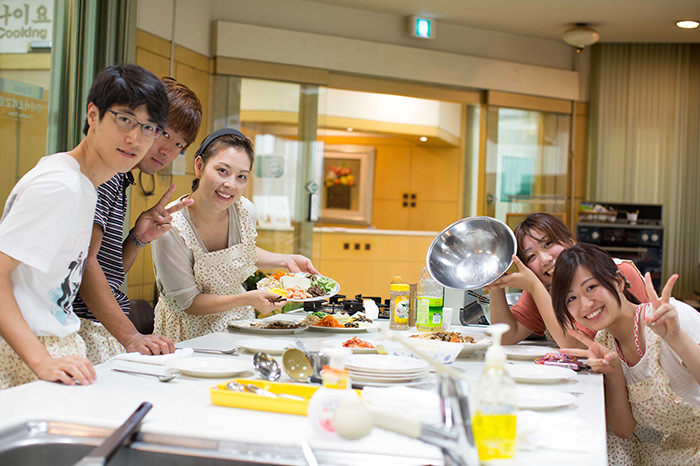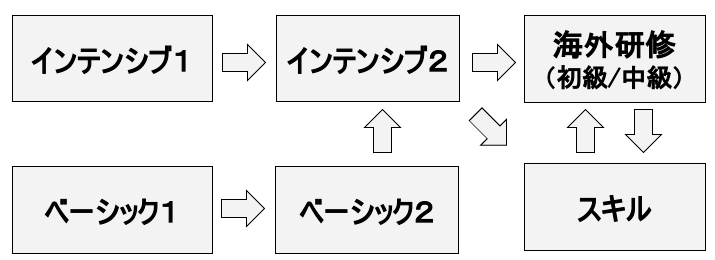
朝鮮語Korean
はじめに
SFC新入生のみなさん、アンニョンハセヨ。
朝鮮語の秘密:一番学びやすい言語
「チリ」、「カムサ」、「ヤグ」は、それぞれ「地理」、「感謝」、「野球」のことです。朝鮮語の多くの漢字語が日本語と共通しているという事実は、日本語を母語とする私たちにとって心強い限りです。朝鮮語での発音も日本語の発音とかなり似ていると思いませんか。
世界には7,000ほどの言語があると言われています。その中で朝鮮語ほど、日本語を母語とする私たちにとって学びやすい言語はありません。その理由としては、①日本語と語順が100%一致していること、②文法が日本語と瓜二つで逐語訳がそのまま日本語になること、③膨大な量の漢字語が日本語と共通していること、そして④文化の深層・基底部分が類似していること、といったことが考えられます。私たちがすでに日本語能力として持っている相当部分が、朝鮮語能力のかなりの部分として、そっくりそのまま利用できるのです。
ハングルの仕組みや発音の基礎を初めて学ぶ初級の段階では、短期間で非常に高いレベルの語学能力を習得できます。日本語の基礎がきちんと身についている人であったならば、朝鮮語が上達するスピードは極めて速いと言えます。他の言語では味わえない達成感を感じることが可能です。
朝鮮語教育のねらい
慶應義塾では古くから朝鮮語教育が実施されてきました。各地区の学部・大学院や外国語学校でも朝鮮語のメニューはありますが、SFCでは開設当初から単なる教養レベルを超えた、第一外国語として本格的に学べるハイ・クオリティーの教育サービスが提供されてきました。外国語学部ではないにもかかわらず、総合政策学部・環境情報学部において最先端の勉学・研究に取り組む学生のみなさんの知的好奇心を十分満足させていけるような充実した教育サービスが準備されています。その目標とするところは、語学それ自体としての朝鮮語の習得にとどまらず、朝鮮語を使って隣国・朝鮮半島の南北に対する総合的な知的理解を深めていくことにあります。朝鮮語を知っているか否かで、隣国に対する理解の度合いが決定的に左右されることは言うまでもありません。さまざまな情報が日々行き交う現在、その中にはニセモノも多く含まれているかもしれません。正しい情報を発見し、整理し、分析し、考察する--こうした一連の知的作業の遂行に朝鮮語の習得は不可欠です。さらに自分のメッセージを外に向けて発信するといった知的作業を朝鮮語で行う--ここまでのレベルの習得をわれわれ教員一同はSFC朝鮮語教育の目標として掲げています。
知的理解の方法としての朝鮮語
ところで韓国は、朝鮮戦争(1950~53年)の廃墟から国家の再建を成し遂げ、「漢江の奇跡」と呼ばれる急速な経済発展を遂げ、世界的な経済大国とまでになりました(2021年の名目GDP基準で世界193ケ国中、第10位)。みなさんはサムスン電子、LG電子、現代自動車といった韓国企業の名前を聞いたことがあるでしょう。スマートフォンやエレクトロニクス、さらには自動車といった分野で、総合力としてすでに日本と同等、あるいはそれ以上の水準に至ったのがこれらの財閥企業です。「韓流」に代表される大衆文化の面では、K-POP、テレビドラマ、ゲームなどの分野においてアジアのみならず欧米にまで至る世界的ブームを巻き起こしています。
このような韓国社会に対する知的理解を一層深めていくためにも、朝鮮語を習得することは不可欠です。朝鮮語を学ぶことで、朝鮮半島に関して扱われる情報量は飛躍的に増加し、皆さんの関心はもっと広がり、深くなっていきます。
SFCでは、朝鮮語分野として語学科目の延長として、現代韓国を理解するためにさまざまなカリキュラムを組んでいます。「韓国地域論」、「韓国社会論」、「現代文化探究(朝鮮語圏)」などの講義科目を通じて、韓国の政治、経済、社会、文化、歴史、さらには朝鮮半島情勢についての知的理解を深めていきます。さらにはこれら講義科目を発展させた形で複数の研究会が運営されています。
日本の文化と自身を省察することができる機会としての朝鮮語学習
言語は文化とまったく関係がないわけではありません。むしろ言語とともに発達し文化の性格を反映しています。文化の一部分であると言えます。そのため朝鮮語を学習する過程で、自然に朝鮮語の中に溶け込んでいる韓国の文化にも接し、理解できるようになります。したがって皆さんは朝鮮語を学びつつ少しずつ韓国の文化を理解できるようになり、さらには韓国と日本の文化比較を行える機会を持つことができるように成ります。
日本と韓国は、歴史的に長い間密接な関連を結びつつ絶えることのない交流を行ってきました。そのため韓国の文化は日本に似た部分がとても多くあり、また異なる部分もあります。皆さんが朝鮮語を学びつつ韓国の文化を理解し、韓国の文化と日本の文化を比較してみることは、日頃は当然だと考えていた日本文化の特性を新たに認識する機会になることでしょう。このような文化的な認識と思考は知性ある人間として、日本の文化と自らを省察できるよい機会となるであろうと思います。
科目ごとの授業内容
1. インテンシブ1・2 (春・秋学期)
朝鮮語を早くマスターしたい人にはインテンシブコースを勧めます。日本語を母語とする人にとって朝鮮語は大変上達が早く、学びやすい言語です。このためインテンシブ1からインテンシブ2まで1年間の授業だけでも熟達できます。インテンシブ1・2の授業では、日常生活の多様なシチュエーションで使える基礎的な語彙や文法、会話表現から学んでいきます。本授業を通し次の内容を取得することを目標としています。
- ハングルを使いこなす能力
- 発信のための基礎会話力
- 基本的文法項目の応用力
インテンシブ1ではミニスピーチを、インテンシブ2ではワークショップを行います。積極的な参加型授業が好きな皆さんのためのプログラムです。
2. 海外研修 (春休み・夏休み)
朝鮮語プログラムでは「現地主義」を大切にする考えから、ソウルにおける海外研修を実施しています。海外研修には〈初級〉の海外研修と〈中級〉の海外研修があります。
〈初級〉の海外研修はインテンシブ2の修了後、春休みや夏休みを利用して3週間、ソウル大学言語教育院で語学研修を受けます。ソウル大学言語教育院ではSFCの学生用に特別プログラムが準備され、非常に中身の濃い学習が行われます。このプログラムの特色としては、以下の通りです。
- SFCの学生用に準備された専用プログラムである。
- SFCの学生3~4人に対して、1人のソウル大生のTAが加わり、一緒に行動しながら教室外での活動を含んだ各種体験学習を行う。
- テーマ中心のミニ・プロジェクトが並行して実施される。
- 伝統衣装、楽器、料理などを通して韓国文化を直接体験する。
この他にもDMZ(非武装地帯)や韓国企業見学など韓国社会について深く学ぶことができるプログラムが組まれています。
なお、〈中級〉の海外研修もソウル大学言語教育院で3週間実施され、より高いレベルの朝鮮語を勉強することができます。〈中級〉の海外研修を通じて専門的な内容の読解、ディスカッション等も行いながら上級の朝鮮語が使えるようになることを目指します。

韓服体験
韓国の伝統的な衣装である韓服を着て、歴史や文化に対する理解を深めました。

料理教室
韓国の伝統宮廷料理である「グジョルパン」と「トッポッキ」を作りました。とても美味しかったです。
3. ベーシック1(春・秋学期) ベーシック2(春・秋学期)
時間数の少ないコースのため、朝鮮語の基礎知識習得を目標としています。毎学期1クラスずつ開講します(春学期のベーシック1は2クラス開講)。ベーシック2の単位を取得した後、インテンシブ2を履修することができます。
4. スキル(会話、聴読解、総合)(春学期)
スキル(多文化、会話、読解、総合、リスニング)(秋学期)
アカデミックなレベルにおける朝鮮語運用能力を高める目的で進められます。各授業には「会話」や「聴読解」など独自のテーマが設定されており、毎学期、複数クラスが開講されます。インテンシブ2の修了を前提とする科目です。この授業で身につけた朝鮮語能力を生かして、先端科目や研究会(卒業プロジェクト)、海外留学などにも積極的にチャレンジしてください。
5. 資格試験
朝鮮語科目の履修にあたっては、前の学期の単位取得状況により、資格試験を受けなければならない場合があります。試験は筆記(単語・表現・文法)、口頭により実施し、1つ前のクラスまでの学習内容が身に付いているかを総合的に判断します。
| 資格試験の種類 | 内容 |
|---|---|
| インテンシブ2 | インテンシブ1(あるいはベーシック2)の単位がない学生が、インテンシブ2の授業に入るために受ける試験 |
| スキル | インテンシブ2あるいはインテンシブ3の単位がない学生が、スキルの授業に入るために受ける試験 |
授業体系図

教員スタッフ
(1)SFCでの担当科目(年度によって変更の可能性あり) (2)専門研究分野
- 柳町 功
Isao Yanagimachi - 総合政策学部 教授
(1)インテンシブ、コーポレートガバナンス、韓国社会論、韓国文化論、研究会
(2)現代韓国論、東アジア経営史・財閥史(韓国・日本) - 髙木 丈也
Takeya Takagi - 総合政策学部 専任講師
(1)インテンシブ、ベーシック、韓国地域論、韓国文化論、研究会
(2)朝鮮語学、方言学、談話分析 - 徐 旻廷
Minjung Seo - 総合政策学部 訪問講師(招聘)
(1)インテンシブ、ベーシック、スキル、現代文化探究(朝鮮語圏)、韓国文化論
(2)社会言語学、朝鮮語学 - 中島 仁
Hitoshi Nakajima - 総合政策学部 非常勤講師 東海大学国際教育センター 准教授
(1)インテンシブ、ベーシック、スキル
(2)朝鮮語学 - 阪堂 千津子
Chizuko Hando - 総合政策学部 非常勤講師
(1)インテンシブ、べーシック、スキル
(2)朝鮮語教授法 - 金 南听
Nameun Kim - 総合政策学部 非常勤講師
(1)インテンシブ、べーシック、スキル
(2)日朝対照言語学、朝鮮語教育 - 徐 銀永
Eunyoung Seo - 総合政策学部 非常勤講師
(1)インテンシブ、べーシック、スキル
*湘南藤沢高等部の朝鮮語授業も担当。
(2)朝鮮語教育、移民学 - 許 秦
Jin Heo - 総合政策学部 非常勤講師
(1)インテンシブ、べーシック
(2)朝鮮語音声学(実験音声学)
Introduction
Dear new SFC students, annyeong haseyo.
Here is a little-known secret about Korean: it is the easiest language to learn for native Japanese speakers or Japanese learners.
Chili, kamsa, and yagu in Korean are chiri (geography), kansha (appreciation), and yakyu (baseball) in Japanese, respectively. The fact that many kanji characters are shared with Japanese is reassuring to those whose native language is Japanese. Don't you think that the Korean pronunciation is quite similar to Japanese?
Experts say that there are about 7,000 languages in the world. Among these languages, there is none easier to learn for Japanese native speakers than Korean. This is due to the fact that 1) the word order completely matches Japanese; 2) the grammar is also nearly identical, so Korean translates into Japanese word-for-word; 3) a vast amount of kanji characters are used in both Korean and Japanese; and 4) the depth and base of the cultures are similar. This means that a large chunk of the Japanese language ability we already have can be directly applied in the same way, compromising a decent portion of Korean language proficiency.
Students who are learning the structure of Hangul and basics of the pronunciation at the beginner level can acquire a very high level of language proficiency in a short period of time. Anyone who has basic Japanese language skills will be able to improve their Korean language skills quite fast. Learning Korean will give Japanese-speaking students a sense of accomplishment they cannot experience studying any other language.
Aims of the Korean Language Education Program
Korean language coursework has long been offered at Keio University. Although undergraduate and graduate programs on each campus as well as Keio Gaigo also offer Korean language courses, SFC has been providing high quality language instruction that allows students to really study Korean, going beyond the liberal arts level since its establishment. Despite not being foreign language faculties, the Faculty of Policy Management and the Faculty of Environment and Information Studies offer a full range of coursework to satisfy the intellectual curiosity of students who are engaged in advanced learning and research. The goal is not only to learn the Korean language, but also to be able to use the language to deepen a comprehensive intellectual understanding of both the north and south of the Korean Peninsula. It goes without saying that whether or not you understand the Korean language is a decisive factor in understanding Japan's neighboring country. Fake news exists among the wide array of information exchanged on a daily basis. It is essential to acquire Korean language proficiency in order to carry out the following series of intellectual tasks: identifying accurate information, organizing, analyzing, and contemplating it. Furthermore, the faculty members at the SFC's Korean Lab aim to provide instruction such that students acquire these abilities, which allow them to carry out intellectual tasks including sharing their messages in Korean.
Korean as a method of intellectual understanding
South Korea rebuilt itself from ruin following the Korean War (1950-1953) and experienced a period of rapid economic growth referred to as "The Miracle on the Han River," eventually becoming an economic giant (ranked 10th among 193 countries in the world in terms of nominal GDP in 2021). You've likely have heard of Korean companies such as Samsung, LG, and Hyundai. These conglomerates have matched or even surpassed Japanese companies in terms of overall strength in areas such as smartphones, electronics, and automobiles. The incredible influence of their pop culture, a phenomenon referred to as the "Korean Wave," is exemplified by K-POP, K-dramas, and video games which have become extremely popular not only in Asia but also in Europe and the United States.
To further deepen intellectual understanding of Korean society, it is essential to learn the Korean language. Learning Korean will allow you to access more information on the Korean Peninsula and to diversify your interests.
As an extension of learning of Korean language courses, SFC offers a variety of curricula for understanding modern Korea. Through lecture courses, including "Korean Regional Studies," "Korean Social Studies," and "Modern Culture (Korean)," students will deepen their intellectual understanding of Korean politics, economy, society, culture, history, as well as the geopolitical situation on the Korean Peninsula. In addition, several Kenkyukai research seminars are offered as an advanced form of these lecture courses.
Learning Korean as an opportunity to reflect on Japanese culture and oneself
Language is inherently intertwined with culture. In fact, culture develops with language and language reflects the character of culture. Language is a part of culture. In the process of learning the Korean language, you will also be exposed to and learn the Korean culture that is baked into the Korean language. Thus, while learning Korean, you will gradually gain an understanding of Korean culture and have opportunities to examine the cultural differences between Korea and Japan.
Japan and Korea have historically had a long close ties and uninterrupted exchange. Korean culture has many similarities to Japanese culture, but also has differences. Understanding of Korean culture through Korean language and comparing Korean culture with Japanese culture will give you an appreciation for Japanese culture that you may have taken for granted. Such cultural awareness and thought will provide us, as intellectuals, an opportunity to reflect on Japanese culture and ourselves.
Course content
1. Intensive 1 and 2 (Spring and Fall Semesters)
It is recommended for students who would like to master Korean language quickly. For those whose native language is Japanese, Korean language is easy to learn and they will be able to progress quickly. They will become proficient within one year of taking Intensive 1 and 2. In Intensive 1 and 2, students learn basic vocabulary, grammar, and conversational expressions that are used in a variety of everyday situations aiming to acquire the following abilities.
- Mastering Hangul
- Basic conversation skills for communication
- Ability to apply basic grammatical points
Intensive 1 includes short speeches, and Intensive 2 includes workshops. Students are encouraged to actively participate in the class.
2. Study Abroad Course (over spring and summer breaks)
The Korean Lab values learning where the language is spoken, and thus offers study abroad programs in Seoul. Two types of study abroad programs are available, which are for *beginner* and *intermediate* levels.
After completing Intensive 2, students in the *beginner* level can undergo language training at the Seoul National University Language Education Institute for three weeks during spring or summer break. In the Seoul National University Language Education Institute, a special intensive language program is offered solely for SFC students. The program features the following:
- The program is exclusively for SFC students.
- Each group of three to four SFC students are paired with one Seoul National University student TA who participates in hands-on exercises including activities outside the classroom.
- Theme-oriented mini-projects are conducted in parallel with the program.
- Experiencing Korean culture through trying on traditional clothing, playing musical instruments, and cooking.
In addition, the program includes a visit to the Demilitarized Zone (DMZ) as well as Korean companies to allow participants to further immerse themselves in Korean society.
The *intermediate* level students can also go on a three-week study abroad program at the Seoul National University Language Education Institute to acquire a higher level of Korean language proficiency. The *intermediate* study abroad program aims for students to acquire advanced Korean language skills through reading specialized subjects and discussion.

Hanbok-wearing experience
Students tried wearing hanbok, traditional Korean clothes, and immersed themselves to understand the Korean history and culture.

Korean cooking clas
Students cooked Korean traditional dishes gujeolpan and topokki, which were very tasty.
3. Basic 1 (Spring and Fall Semesters) and Basic 2 (Spring and Fall Semesters)
Basic 1 and 2 focus on acquiring basic Korean with a fewer number of class hours. One course each is offered every semester (two courses will be offered for Basic 1 in the Spring Semester). After acquiring credits for Basic 2, students may take Intensive 2.
4. Skill (reading comprehension, conversation/composition; Spring Semester)
Skill (listening and reading comprehension, vocabulary; Fall Semester) The course is designed for students to improve their academic Korean language ability. Two Skill courses are offered every semester and each course has its own theme such as reading comprehension and conversation/composition. Students who completed Intensive 2 may take this course. We encourage students to take courses such as the Advanced courses or Kenkyukai research seminar (Graduation Project), or to participate in the study abroad program using the Korean language skills they acquired from these courses.
5. Qualifying Examination
An examination may be required to qualify to take Korean language courses depending on the credits the student earned from relevant courses in the previous semester. The examinations will include written (vocabulary/expressions/grammar) and oral, to comprehensively determine whether the student has acquired the skills and knowledge they would have in the preceding prerequisite course.
| Examinations Content | 内容 |
|---|---|
| Intensive 2: | An exam required for students, who have not earned credits for Intensive 1 (or Basic 2), to register for Intensive 2. |
| Skill: | An exam required for students, who have not earned credits for Intensive 2 or Intensive 3, to register for the Skill course. |
Class System Diagram

Faculty members
- Isao Yanagimachi
- Professor, Faculty of Policy Management
(1) Intensive 1, Intensive 2, Corporate Governance, Korean Social Studies, Korean Cultural Studies, Kenkyukai
(2) Modern Korean Studies, East Asian Business History, Zaibatsu History (Korea/Japan) - Takeya Takagi
- Assistant Professor, Faculty of Policy Management
(1) Basic 1, Intensive 1, Intensive 2, Korean Cultural Studies, Korean Regional Studies, Kenkyukai
(2) Korean Language Studies, Dialectology, Discourse Analysis - Minjung Seo
- Visiting Lecturer, Faculty of Policy Management
(1) Intensive 1, Intensive 2, Basic 1, Basic 2, Skill (conversation), Modern Culture (Korean), Korean Cultural Studies
(2) Korean Linguistics, Korean Syntax/Pragmatics - Hitoshi Nakajima
- Part-time Lecturer, Faculty of Policy Management; Associate Professor, Tokai University Language Education Center
(1) Intensive 2, Basic 2
(2) Korean Language Studies - Chizuko Hando
- Part-time Lecturer, Faculty of Policy Management
(1) Intensive, Basic, Skill
(2) Korean Language Teaching Methods - Nameun Kim
- Part-time Lecturer, Faculty of Policy Management
(1) Intensive, Basic, Skill
(2) Contrastive linguistics between Japanese and Korean, Korean language education - Eunyoung Seo
- Part-time Lecturer, Faculty of Policy Management
(1) Intensive, Basic, Skill
*Also teaches Korean at Keio Shonan Fujisawa Senior High School.
(2) Korean language education, Migration studies - Jin Heo
- Part-time Lecturer, Faculty of Policy Management
(1) Intensive, Basic
(2) Korean Phonetics (Experimental Phonetics)